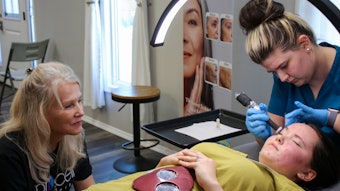When stress becomes part of Monique Iacobacci’s day, she switches pens. As the manager of Experience Life Spa in Jersey City, New Jersey, Iacobacci knows all about work-related stress. She, like many spa owners and managers, needs a way to release that stress when irate customers or marketing headaches send her anxiety level soaring. Writing with her “happy pen,” complete with feathers, is one of Iacobacci’s stress-relieving activities. But it certainly doesn’t end there.
“When I feel myself really stressed out, I try to walk away for a minute,” she says. “I say what I have to say, and I try to keep myself composed. If it really starts escalating, I’ll say ‘We’re going to talk about this at the end of the day.’ ”
The tension-building situations spa owners deal with can seem endless—the client who didn’t keep an appointment, the one who did but you wish hadn’t. Days spent pampering clients at the same time as managing a team, as well as the financial pressures that come with running a business, can congeal into one big ball of stress. Finding ways to release the negative feelings these situations create is essential for keeping a spa running smoothly and maintaining a therapeutic atmosphere.
Fighting stress
Deep breathing, stretching or simply stepping away for a few minutes are ways to cool down when your blood begins to boil, says Christine Matheis, wellness coordinator for corporate health at Northwest Community Healthcare in Arlington Heights, Illinois. Take a break—you need it every now and then. You’ll likely come back refreshed and in a better, more problem-solving state of mind.
When Dawn Kepner feels the strain a hectic day can bring at Apropos Skin Therapies in Roswell, Georgia, she takes a walk around the block or goes into her office and closes the door. She finds the time alone without questions or distractions soothing. “If I go into my office and close the door, that’s a clue that I need a little quiet time, and that I need a break,” says Kepner, the spa’s owner.
Angela Cortright, who owns Spa Gregorie’s in Newport Beach, California, and Spa Gregorie’s Rancho Santa Margarita in Rancho Santa Margarita, California, tries to keep stress out of her spa before it becomes a problem. She’s all about making the work atmosphere light and fun—laughter just seems to melt anxiety away. But when “the 15,000 balls” she juggles at once begin to overwhelm her, she takes a step back and determines what balls are critical. She doesn’t let all the layers that come with the daily grind get in the way, and that helps her stay focused.
Stress multiplies, Cortright says, so if she freaks out, it affects her employees. “When you lose control, you absolutely are ineffective as a manager. And you’re very likely to say something or do something that you’ll sorely regret,” she says.
Instead, try inhaling and exhaling. Deep breathing is the most simple stress-relief tool because it can be done anywhere, even when you’re dealing with an unhappy customer. Clearing your mind and progressive muscle relaxation are other options—all spa owners have to decide what works best for them. For some, a combination of relaxation techniques is the best path toward stress reduction.
Iacobacci also turns to her spirituality when the anxiety gets to be too much. “I do a lot of praying, too,” she says. “Because sometimes you can say something in prayer that you can’t ever say to someone else. And it’s a very good release.”
Stress at home
The battle against stress doesn’t have to begin when you’re faced with a troublesome situation on the job, says Suzanne Hendershot, manager of cardiopulmonary employee wellness at St. Rita’s Medical Center in Lima, Ohio. Exercising, snuggling up with a good book and treating yourself to a long, hot bath can help you release negative energy after a day you’d rather forget has finally ended. But if you can get away for five or 10 minutes, Hendershot recommends incorporating exercise into your workday as well, especially if you’re feeling tension starting to build. Aerobic activity works best, but some form of stretching also can calm those nerves. Exercise helps decrease the heart rate and blood pressure, leading to a higher oxygen level in your muscle tissues and a calmer you.
“It gives you a more positive mental attitude,” Hendershot says. “It gets you away from the situation, and it gets you to think about something else.”
Rosemary Weiner takes alone time at least twice a week to reduce her stress. On these days, she doesn’t go into The Brass Road in Blairstown, New Jersey. This owner and senior manager works from home, and finds this to be when she’s most productive. “It allows me when I come back to have a fresh outlook, and it allows me to work primarily undisturbed,” Weiner says. “When I look at the financial picture, I can do that without someone knocking on my door or having to do day-to-day stuff.”
Financial worries
As with any business, spa owners and managers have to think about money, which can lead to some stressful situations. “Basically, as the owners and senior managers, we deal with a lot of outside issues,” Weiner says. “We have to worry about financials and staff.” She doesn’t try to do it all on her own. Two team members help her with the business end so she can focus on the creative side. Surround yourself with people who know how to manage their responsibilities to help keep stress levels down.
Beyond looking at the big financial picture, spa owners constantly need to think about keeping expenses low, Iacobacci says. Creams, lotions and an array of other products that clients expect are costly, making it a challenge to keep expenses from climbing.
Marketing her business is another stressor for Iacobacci—she wants to make sure her money goes toward savvy business ideas, and making such decisions can lead to anxious moments. “You have to weigh profit and loss,” she says.
Employee relations
Keeping the team happy alleviates some of the anxiety that falls on a manager’s shoulders. Weiner does her best to keep stress away from her employees and to deal with disagreements before they get out of control. In between clients, each service provider gets a 15-minute break to meditate, stretch or relax—whatever is needed to decompress and prepare for the next client.
Team members also are encouraged to take advantage of spa services, Weiner says. They spend their days pampering others. Therefore, sometimes they need to take their turn on the other end of the table. Employees can enjoy these services at a free or discounted price, so getting a tension-reducing massage will help them relax without putting a strain on their budget.
Even when you have a good team, problems can arise. Weiner deals with these by talking out the matter, whether it involves two employees or five. She finds that most friction results from communication failures.
Iacobacci stresses that no matter what the problem, employees can come to her or the head of their department. If her employees can work out their problems on their own or have a trusted manager to whom they can turn, that stress is relieved in them and in her. “We have issues come up. It’s not a bad thing; it’s a good thing. Let’s deal with it.”
Client control
Unhappy clients are a common source of spa-related stress. When a client clash occurs, Matheis recommends taking a step back to think about the situation before saying something that might cause you to lose a client.
Whether Iacobacci is calming down a pregnant woman who can’t stop crying at the front desk because her treatment wasn’t satisfactory or she’s explaining why it’s OK to have both women and men on the massage team, she doesn’t let situations escalate in front of other clients. She moves the conversation into her office and really listens to the complaints. Talking it out helps, but Iacobacci would rather avoid the irate customer scenario completely. That’s why in-depth client consultations become so important. The better you understand your clients’ wants and needs, the less likely they’ll be to feel unhappy with their service.
Although unhappy clients cause stress, so do no-shows, Kepner adds. Technicians prepare for each appointment, so when someone doesn’t show up or cancels at the last minute, they’re left with the disappointment of a vacant time slot. To Kepner, that’s one of the biggest tension-inducers spa professionals face. When she sees frustrated team members, she reminds them why they’re there. “This is a service business. We’re here for their convenience,” Kepner says. “It’s part of the job description.”
Take your own advice
Prayer, meditation or exercise—everyone uses something different to ease the strain from today’s busy lifestyle. Spa professionals need to take advantage of the built-in relaxing atmosphere at their workplace. “Get out of your spa. Go to somebody else’s spa and be invisible,” Cortright suggests. “Let the therapy that’s so beneficial to others help you.”
When you can’t get out of your spa, stop for a minute and experience some of its smells and really appreciate the environment that’s meant to soothe. Listen to the music and let yourself go. Breathe deeply and just relax. Lose yourself for a few moments in the spa atmosphere you have worked so hard to create, and where so many come for pampering and relaxation.










